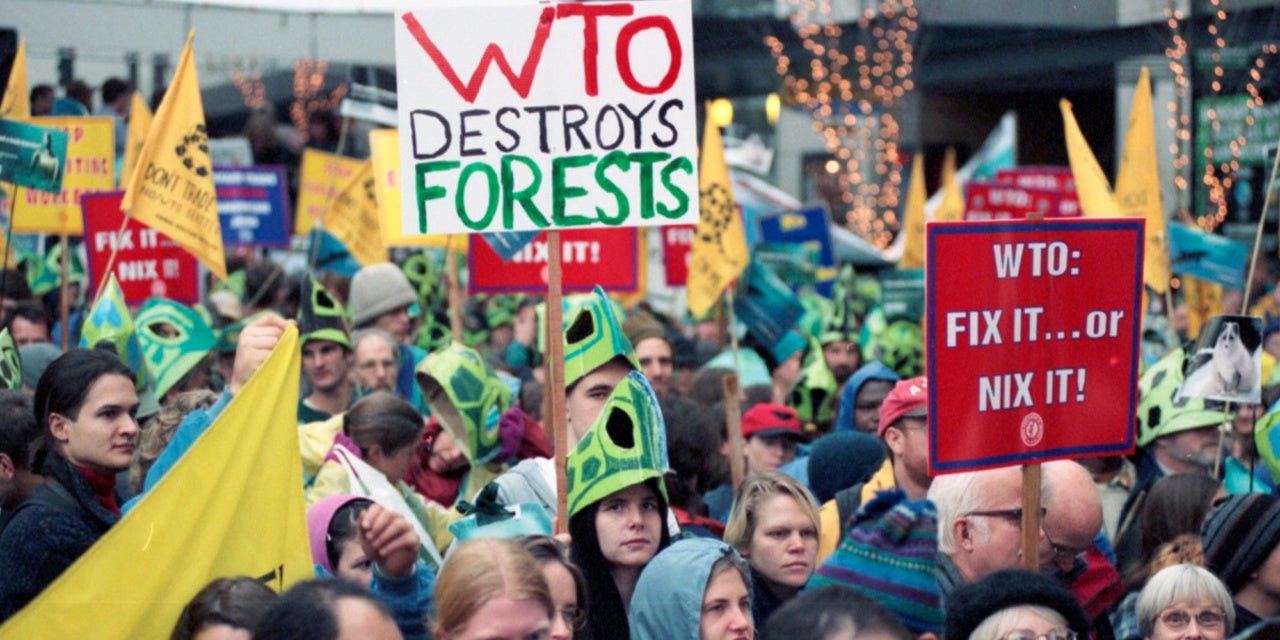Twenty years ago, the Seattle WTO protests brought attention to the fact that all was not necessarily smooth sailing for global capitalism, despite what appeared to be unstoppable momentum over previous decades.
Ten years earlier, in November 1989, the Berlin Wall fell, ushering in the collapse of communism across Eastern Europe – a capstone event heralding the triumph of global free markets and democratic societies. It looked like there would be greater regional and international cooperation. And the Internet could mean new business opportunities and the death of distance.
But there were already concerns. Companies consolidated and cut local ties. I journeyed along the textile trail from my home state of Massachusetts to South Carolina to Hong Kong and Indonesia, and heard that Indonesian manufacturers were starting to worry about losing the industry to Vietnam. In the late 1980s, I testified before a US Congressional task force on manufacturing concerned about the loss of well-paying American factory jobs – nearly 30 years before that issue helped propel a populist to the presidency. Global trade opened markets and helped lower domestic prices, but the seeming efficiencies of outsourcing and offshoring also entailed races to the bottom and wrenching dislocations.
Backlash shouldn’t have come as a surprise. Seemingly inevitable trends can go too far, bringing counter-trends, countervailing forces, and dialectics of thesis and antithesis. What’s good for some people can come at the expense of others who are less fortunate.
Cosmopolitans and locals have always had different interests. Research for my 1995 book, World Class: Thriving Locally in the Global Economy, took me to mill towns with shuttered factories where I spoke with people traumatized by blows to their way of life. There was a Buy American movement in the early 1990s. Ross Perot’s third-party presidential bid had populism written all over it – his “giant sucking sound” of jobs going to Mexico.
So when I spoke at an opening agenda-setting session of the World Economic Forum in Davos in January 1996, to an audience ready to declare “Globalization and capitalism have won!” I warned that future headlines could read, “Populism and socialism are back!” That is, unless elites with power and authority took action to address negative consequences, rein in excesses, ameliorate losses, and ensure a system that could include or feel fair to everyone. Did they? Or did they mistakenly assume that the pendulum would swing only in one direction?
Now, at the end of 2019, backlash against globalization exemplified by the 1999 WTO protests has become louder and more vociferous. Especially in places in which people feel losses have outweighed gains – even if the evidence doesn’t always back the emotions. Change is hard enough unless there is empowerment to make choices and ample transition assistance; otherwise, too many changes in too rapid succession are too much for most people to cope with.
Populism and autocracy are rising trends. But it would be a mistake for their representatives to declare victory prematurely, just as it was for advocates for global capitalism. Every trend still contains the seeds of counter-trends. Every seemingly unstoppable force engenders countervailing forces and the possibility for corrective action. Don’t short global trade or capitalism yet.
And don’t give up on democracy either. My forthcoming book, Think Outside the Building: How Advanced Leaders Can Change the World One Smart Innovation at a Time, showcases a new army of democracy – values-oriented millennials and baby boomers who are taking responsibility themselves for solving problems of climate change, gun violence, college affordability, racial and gender inequities, health disparities, refugee resettlement, local journalism, and skills for jobs of the future. Actions such as theirs could engender hope and once again shift the political mood.
Progressive business leaders should join them in being a force for good in the world, by owning up to the problems of people left behind and taking actions to reduce inequities and open opportunities. Some are doing this, but not enough. Social responsibility must go from the fringes to the center of business strategy. Just where it should have been from even before the WTO protests.
Recently interviewed for Business 20/20, a podcast of the Aspen Institute’s Business & Society Program, Rosabeth Moss Kanter (@RosabethKanter) is the Arbuckle Professor at Harvard Business School, former chief editor of Harvard Business Review, and founding chair and director of the Harvard University Advanced Leadership Initiative from 2005-2018. Author of 20 books, her newest is Think Outside the Building: How Advanced Leaders Can Change the World One Smart Innovation at a Time (January 28, 2020, New York: PublicAffairs).
Image Source: Creative Commons

